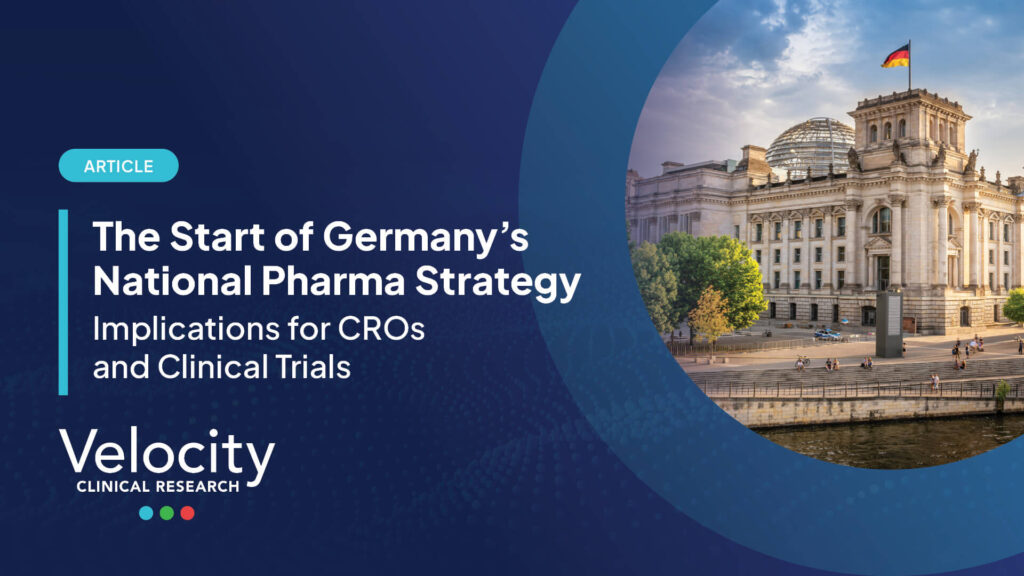Over the past decade, Germany’s share of global clinical trial activities has dropped year on year. The country accounted for just 3.9% of trials in 2021, down from 7.2% in 2012. Late last year, the German Government published its National Pharma Strategy, which is designed to reverse this trend. Aiming to revitalize the country’s pharmaceutical industry, it signaled a shift from policymakers on clinical research and drug development issues.
The strategy outlined several measures to address the country’s declining role in global clinical trials, safeguard pharmaceutical supply chains, speed up approvals, and reduce bureaucracy. The Medical Research Act (MFG), enforceable from January 1, 2025, is the first legislative step in implementing the broader National Pharma Strategy.
Addressing Germany’s Pharma Challenges
The National Pharma Strategy is designed to reverse a declining trend of clinical trial participation by fostering faster trial approvals, improving market access, and reducing regulatory barriers.
It focuses on accelerating clinical research and enhancing Germany’s appeal to pharmaceutical companies. As such, it introduces reform in several areas:
- Simplifying agreements: The government intends to continue with its work to publish non-enforceable, standardized contractual clauses to speed up negotiations and simplify the approval process.
- Manufacturing incentives: Introduces financial incentives to establish more manufacturing sites, particularly for critical medicines such as antibiotics and oncology drugs.
- Digitalization: Establishing a national health data space to make health data more accessible, facilitating research and innovation.
- Pricing reforms: Starting January 1, 2025, new rules for confidential reimbursement will come into effect under the country’s HTA (AMNOG) reimbursement pricing framework. These pricing reforms are designed to enhance the competitiveness of the German market.
The Medical Research Act
The first legislative element of the National Pharma Strategy, The Medical Research Act (MFG), amends national laws governing drug and medical device trials, the rules around Advanced Therapy Medicinal Products (ATMPs), and the HTA (AMNOG) pricing and reimbursement system.
For the first time, the Act also establishes a link between drug pricing and where clinical trials are conducted. Pharmaceutical companies that conduct a ‘relevant part’ of their clinical trials in Germany — enrolling at least 5% of global trial participants in the country — will benefit from more flexible pricing rules. This provision is expected to encourage more companies to prioritize Germany as a trial location.
Are Pricing Incentives Enough to Shift Focus to Germany?
While the new pricing incentives offer clear benefits, whether they will be enough to drive a major increase in clinical research in Germany remains to be seen. Several factors influence study placement, including trial speed and patient recruitment efficiency. Pharmaceutical companies may hesitate to delay the global completion of a study just to meet the 5% German enrollment threshold, particularly if it affects the timely launch of a product.
That said, the new rules will likely elevate Germany’s priority in trial design. CROs might be tasked by biopharma to ‘ring-fence’ a portion of the patient recruitment for Germany so the sponsor can benefit from the relaxed pricing rules. However, the broader decision will depend on the overall impact on trial timelines and logistics.
Supporting CROs and Sponsors
Velocity Clinical Research is well-positioned to help boost trial participation in Germany. Our global network of clinical trial sites includes six in Germany, where our Principal Investigators are known for their expertise in a range of therapeutic areas:
- Watz, Dr. Kristin (Arensburg), and Dr. Ludwig-Sengpiel (Luebeck) specialize in respiratory diseases.
- Schenkenberger (Berlin) focuses on internal medicine.
- Jambrecina (Hamburg) is an expert in vaccines.
- Sendeski (Wiesbaden) is a trained neurologist.
- Mehltretter (Leipzig) leads in pharmacovigilance.
- Müller (Leipzig) specializes in pediatrics.
Like all teams across the Velocity network, our German sites are led by experienced trial staff committed to providing the highest-quality patient care and delivering the right patients, investigators, and research staff for your next project.
To discuss how you can reliably and quickly scale recruitment in Germany, contact Evelyne Newton at enewton2@velocityclinical.com.

